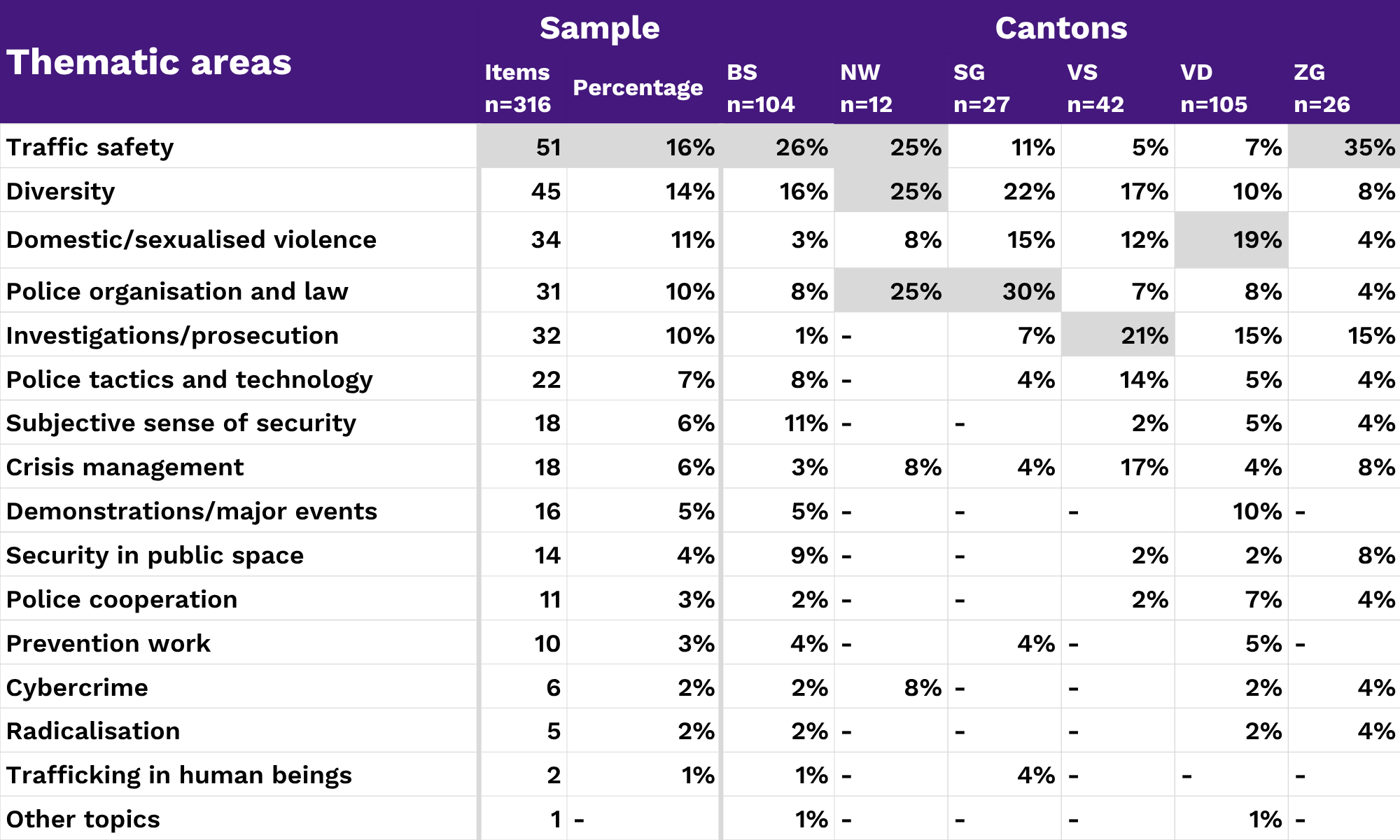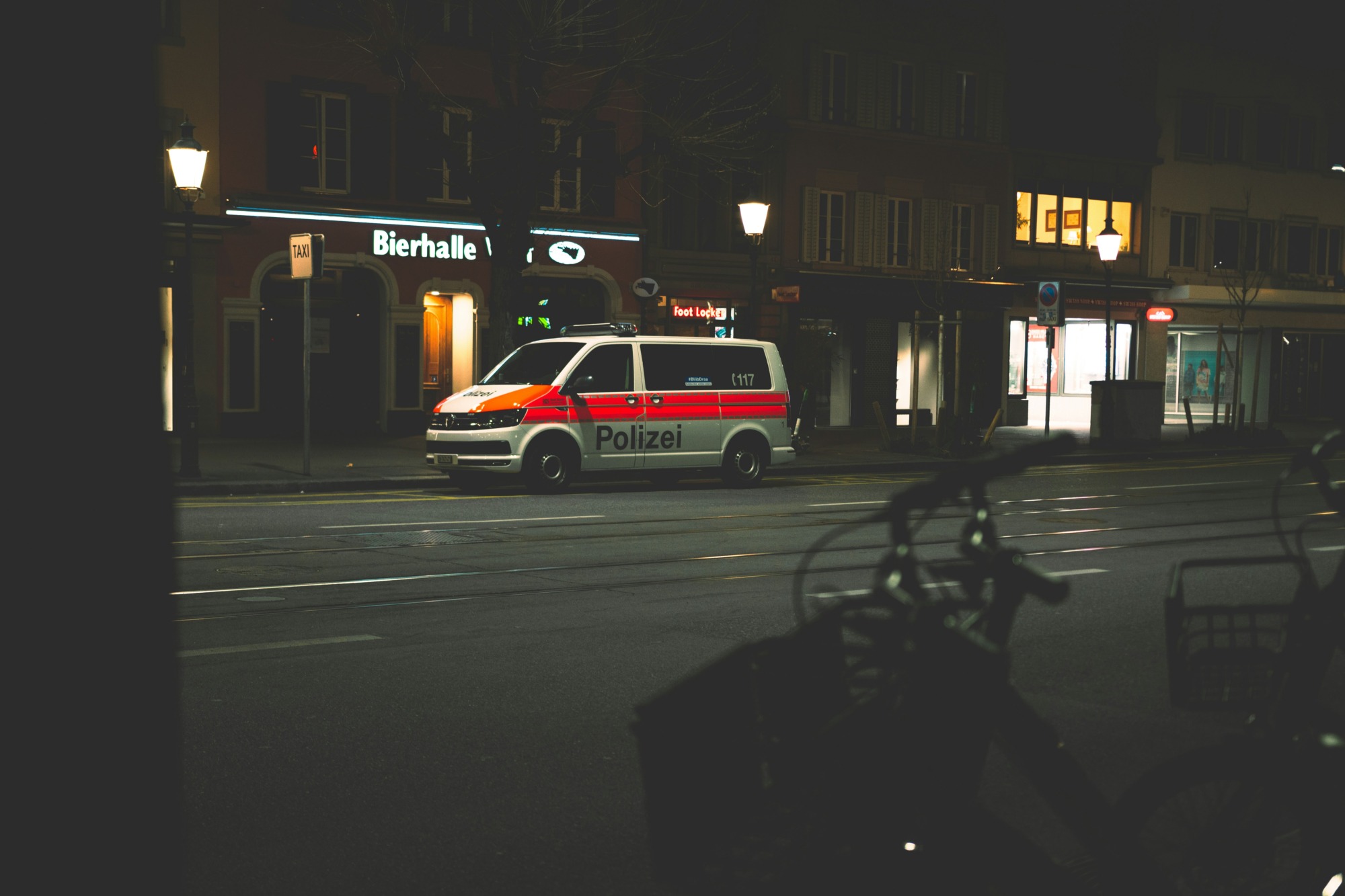The police sector is primarily a cantonal policy area. Also because of this, political debates surrounding policing in Switzerland are still largely under-researched. A recent snapshot analysis sheds light on how members of the cantonal parliaments engage with policing matters. The findings reveal varying degrees of parliamentary activity and a wide thematic range in their dealings with police issues — coupled with a notable reluctance to employ the most powerful parliamentary tools.
The police hold an ambivalent position within society and politics: while they assist citizens and prevent harm, they also investigate crimes, enforce regulations, and curb behaviour that breaches social norms. In doing so, they address a broad spectrum of social issues — ranging from poverty, aging, and social exclusion to abuse and violence. Unsurprisingly, the resource-intensive nature of policing thus attracts significant public interest. Particularly in cases of high-profile offenses, spectacular police operations, and misconduct within a corps, the police receive considerable media attention.
However, media coverage constitutes only one aspect of the political discourse on policing—and one that exerts limited influence over police regulation. Much closer to the centres of political power are the cantonal parliaments. How they engage with policing, however, remains underexplored in Switzerland. It is still largely unknown how intensively parliamentarians deal with police forces and their practices, which policing topics they focus on, and which parliamentary instruments they utilize to address these matters.
Data-driven visualization of parliamentary handling
A new data-driven analysis makes this engagement visible. It illustrates how the political contestation of policing is situated within the cantons — and how the parliamentary approaches vary between them. For the analysis, we identified and coded all parliamentary items related to policing in the cantons of Basel-Stadt, Nidwalden, St. Gallen, Valais, Vaud, and Zug for the calendar year 2023. We selected this sample based on criteria such as degree of urbanization, parliamentary size, and linguistic region. These six cantons collectively represent roughly one quarter of Switzerland’s cantons, population, and police personnel. [1]
The snapshot reveals that in the cantons studied, no fewer than 316 parliamentary items related to the police were addressed in 2023. This corresponds to an average of 52 items per year — nearly one new parliamentary item per calendar week — in each canton. However, there are striking differences in the intensity of this engagement between the parliaments. In Vaud and Basel-Stadt, policing matters were addressed nearly nine times more frequently during the study period than in the canton of Nidwalden. The Grand Conseil of Vaud and the Basel-Stadt Grosser Rat thus dealt on average with two new police-related items per week, whereas the Nidwalden Landrat handled only one such matter per month.
The cantonal contestation of policing
When doing so, policing is debated across a range of thematic areas. The cantonal parliaments devote the most attention to traffic safety issues, such as implementing 30 km/h zones and improving school and bicycle paths. This focus is somewhat unexpected and diverges from the typical media portrayal of policing. After traffic safety, considerable attention is devoted to diversity issues – such as managing migration policy challenges, police engagement with people from diverse backgrounds, and fostering diversity within police forces themselves. Other key topics include domestic and sexualized violence, as well as police organization and law. In contrast, issues such as prevention work, cybercrime, radicalization, and human trafficking receive comparatively little parliamentary consideration. Although these themes are recognized as important by experts and are supported by national action plans, cantonal parliaments engage with them only minimally.
Table 1: Focus of Cantonal Parliaments on Police Matters  Figure: Sophie De Stefani, DeFacto · Data source: Grüninger and Hagmann.
Figure: Sophie De Stefani, DeFacto · Data source: Grüninger and Hagmann.
However, differences between the cantons are apparent here as well. Parliamentarians in Basel-Stadt and Vaud engage with the full spectrum of thematic approaches to policing. In contrast, those in Zug, St. Gallen, and Valais concentrate on fewer aspects, while the Nidwalden parliament takes an even more selective approach, addressing only very specific dimensions. Nonetheless, the data indicate that policing is generally addressed from multiple perspectives in parliamentary practice — and not limited to a few frequently debated topics, such as racial profiling or demonstrations.
Table 2: Use of Parliamentary Instruments  Figure: Sophie De Stefani, DeFacto · Data source: Grüninger and Hagmann.
Figure: Sophie De Stefani, DeFacto · Data source: Grüninger and Hagmann.
Finally, the analysis reveals a distinct pattern in the use of parliamentary instruments. Simple questions and interpellations, i.e., limited requests for information, dominate parliamentary work focused on policing. Coming in second are invitations and proposals to the cantonal government, known as postulates. Together, these information requests and non-binding demands constitute the majority of parliamentary activities related to policing. Motions, the most powerful and binding legislative instruments, are used very rarely. In this regard, differences between cantons are minimal. Only in Basel-Stadt and Vaud are motions employed slightly more frequently in police-related matters.
Political science examination of cantonal security governance
Which political parties focus on policing, and at the hands of which topics and instruments? Are certain parliamentary tools used more frequently for some specific thematic areas? To what extent is the parliamentary contestation of policing shaped by current events, as opposed to more fundamental and long-term debates about policing? And what influence does the volume of parliamentary activity have on the quality of cantonal security policy?
The data-driven analysis demonstrates that policing is a topic of frequent and thematically broad contention within cantonal politics. However, the most powerful parliamentary instruments are rarely employed, and the level of attention given by individual cantonal parliaments varies quantitatively, substantively, and occasionally also formally. This empirical approach thus illustrates how data-oriented security research can provide a more tangible understanding of cantonal security policy.
This approach makes the cantonal security sector – traditionally examined through legal and formal-juridical lenses first and second [2] – more accessible to political and social science security research. [3] Such an approach enables systematic inter-cantonal comparisons and generates compelling analytical questions, for example, regarding the influence of cantonal degrees of urbanization, parliamentary sizes, regional linguistic political cultures, and party affiliations on how cantonal parliaments engage with policing.
[1] Konferenz der Kantonalen Polizeidirektorinnen und -direktoren (2023). Polizeibestände. Bern: KKPKS. [2] Jonas Hagmann and Anna Wolf (2024). How the police and academia are discovering each other in Switzerland. DeFacto. 10th January. [3] For the research gap regarding cantonal security politics, see Andreas Wenger (2022). Sicherheitspolitik. In: Yannis Papadopoulos et al., Handbuch der Schweizer Politik. Basel: NZZ Libro, 703-729.
Image: Unsplash.com





